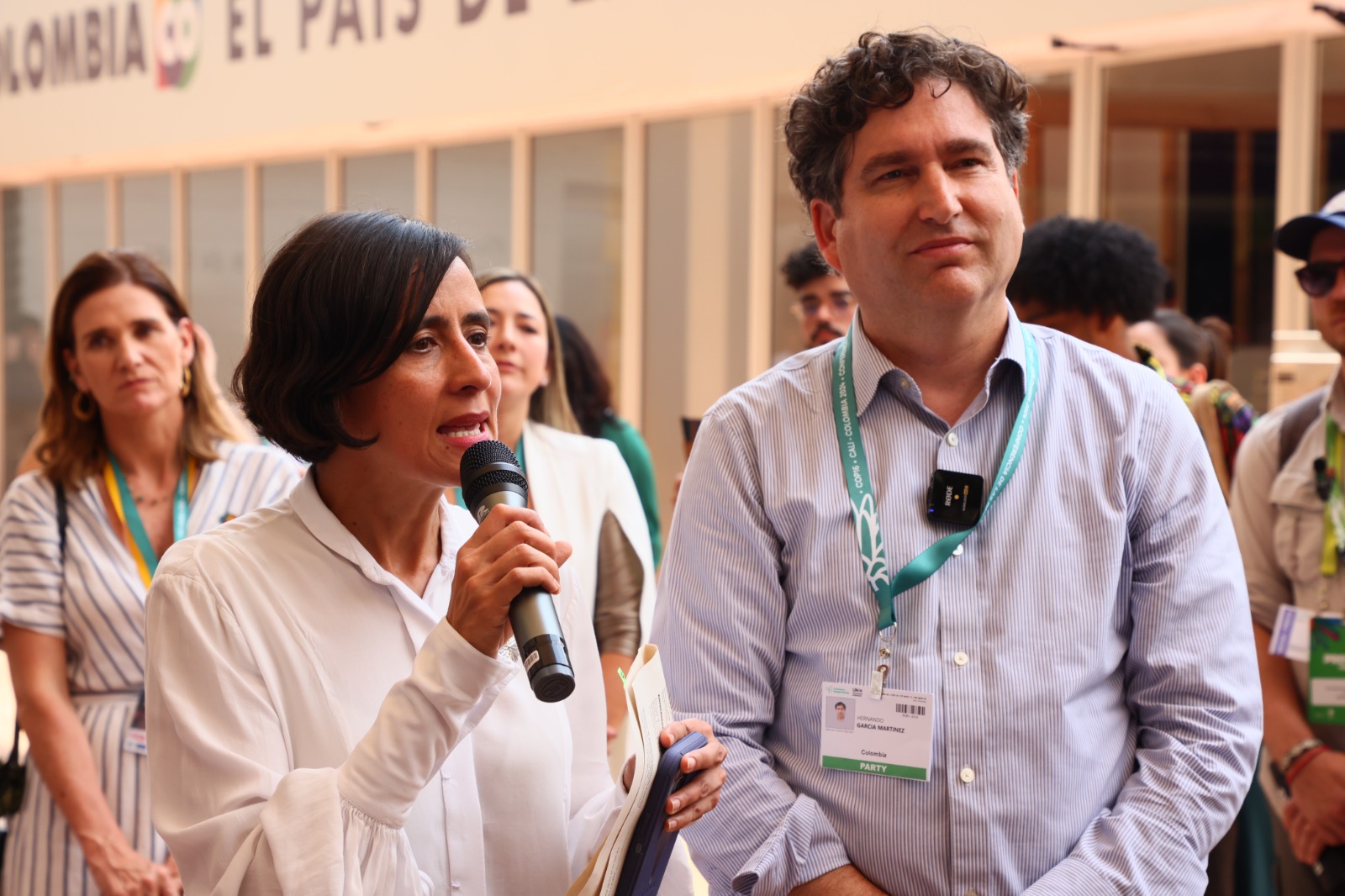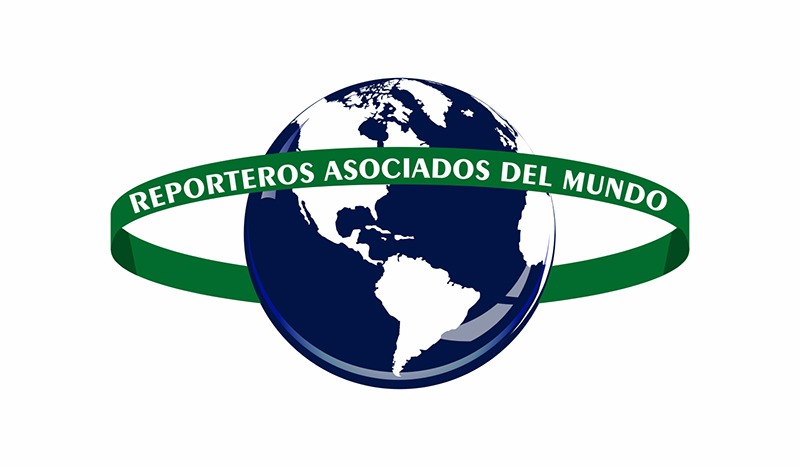Instituto Humboldt de Colombia es seleccionado como centro de apoyo técnico y científico para América Latina y el Caribe

En el marco de la COP16, que se está desarrollando en la ciudad de Cali, la ministra de Ambiente y Desarrollo Sostenible, Susana Muhamad y el director del Instituto Humboldt, Hernando García dieron a conocer que el Instituto Humboldt fue elegido como centro subregional de apoyo técnico y científico por parte del Convenio sobre la Diversidad Biológica (CDB).
- El Instituto de Recursos Biológicos Alexander von Humboldt, del Sistema Nacional Ambiental de Colombia, prestará apoyo técnico y científico a 12 países de América Latina y el Caribe.
- La designación, que irá hasta 2030, busca fortalecer las capacidades técnicas y científicas de las partes del Convenio sobre Diversidad Biológica para facilitar la implementación de las metas del Marco Global de Biodiversidad Kunming Montreal.
- El Humboldt es uno de los tres centros seleccionados para la región entre 42 entidades postuladas en el mundo.
Cali,25 octubre 2024_ RAM _ En el marco de la COP16, que se está desarrollando en la ciudad de Cali, la ministra de Ambiente y Desarrollo Sostenible, Susana Muhamad y el director del Instituto Humboldt, Hernando García dieron a conocer que el Instituto Humboldt fue elegido como centro subregional de apoyo técnico y científico por parte del Convenio sobre la Diversidad Biológica (CDB).
“Es para nosotros un gran honor anunciar que el Instituto Humboldt, parte del Sistema Nacional Ambiental, SINA, ha sido designado como uno de los centros regionales para brindar apoyo técnico y científico en América Latina. Nos enorgullece que uno de nuestros institutos sea ahora uno de los centros regionales gracias a su capacidad científica», indicó la ministra de Ambiente, Susana Muhamad.
Esta designación surge de una decisión tomada durante la COP15 de biodiversidad, que tuvo ocasión en diciembre de 2022, en Montreal. Las partes (países miembros) acordaron que se debía crear un mecanismo de cooperación técnica y científica que facilite la implementación del Marco Kunming Montreal, para esto se estableció que dicho mecanismo de cooperación se haría a través del establecimiento de centros regionales de apoyo, acompañados por una entidad de coordinación global.
“Esta designación es un reconocimiento a la capacidad técnica y científica del Instituto Humboldt, a su músculo de relacionamiento y su conocimiento para establecer alianzas estratégicas locales e internacionales; lo cual redundará en la implementación del Marco Kunming Montreal. Es un honor haber sido elegidos como el único centro de América Latina y uno de los tres de América Latina y el Caribe, en una región que alberga más del 60% de la biodiversidad terrestre del planeta y seis de los 10 países megadiversos del mundo. Esta región también es el hogar de más de 800 pueblos indígenas, guardianes fundamentales de este tesoro natural. Los esfuerzos de conservación en América Latina y el Caribe tienen el potencial de generar impactos significativos a nivel global y local, y esta designación refuerza nuestro compromiso con esa misión”, afirmó Hernando García Martínez, Director del Instituto Humboldt.
El Instituto Humboldt tendrá la tarea de asesorar y apoyar a 12 países: Argentina, Brasil, Ecuador, Paraguay, Venezuela, Cuba, Uruguay, Perú, Chile, Bolivia, México y Colombia, Así, Colombia serán un punto de convergencia para iniciativas internacionales, promoviendo el intercambio de conocimientos y fortaleciendo las redes para abordar desafíos ambientales de manera conjunta; además de asesorar en el uso eficaz de la ciencia, la tecnología y la innovación para apoyar la implementación del Marco Global.
Así fue el proceso de selección
En 2023 se inició un proceso de expresión de intereses y selección abierta. En la primera etapa, 42 entidades y organizaciones a nivel mundial presentaron su manifestación de interés, de las cuales se invitó a 26 entidades a participar en la segunda fase del proceso de selección y a facilitar información detallada.
La rigurosa evaluación por parte de la Secretaría del CDB tuvo en cuenta: la experiencia brindando asesoramiento técnico en la planificación e implementación de proyectos, la capacidad de movilizar recursos para la cooperación técnica y la dotación de personal e infraestructura; entre otros.
El Instituto Humboldt fue el ganador entre los postulados en América Latina. En total, en el mundo se establecieron 18 centros (5 en África, 3 en América, 5 en Asia, 4 en Europa y 1 en Oceanía). El anuncio de los seleccionados fue dado a conocer durante el SBI4 (Subsidiary Body on Implementation), que se llevó a cabo en Nairobi entre el 21 y 29 de mayo de 2024.
¿Qué papel cumplirán los centros regionales?
- Promover y facilitar la cooperación técnica y científica y la transferencia de tecnología entre países desarrollados y países en vía de desarrollo.
- Generar convenios relacionados con la biodiversidad, los pueblos indígenas, comunidades locales, organizaciones de mujeres y jóvenes para que tengan acceso al conocimiento, experiencia y recursos técnicos científicos.
- Movilizar recursos para brindar apoyo oportuno a proyectos y actividades científicas.
- Identificar, recopilar y difundir buenas prácticas y lecciones aprendidas en materia de cooperación técnica y científica, transferencia de tecnología e innovación relacionadas con la biodiversidad y la investigación biotecnológica.
Colombia’s Humboldt Institute selected as technical and scientific support center for Latin America and the Caribbean
- The Alexander von Humboldt Institute for Biological Resources, part of Colombia’s National Environmental System, will provide technical and scientific support to 12 countries in Latin America and the Caribbean.
- The designation, which will run until 2030, seeks to strengthen the technical and scientific capacities of the parties to the Convention on Biological Diversity to facilitate the implementation of the goals of the Kunming Montreal Global Biodiversity Framework.
- The Humboldt is one of the three centers selected for the region among 42 nominated entities in the world.
Cali,25 october 2024_ RAM _ In the framework of the COP16, which is being held in the city of Cali, the Minister of Environment and Sustainable Development, Susana Muhamad and the director of the Humboldt Institute, Hernando García, announced that the Humboldt Institute was chosen as a sub-regional center for technical and scientific support by the Convention on Biological Diversity (CBD).
“It is a great honor for us to announce that the Humboldt Institute, part of the National Environmental System, SINA, has been designated as one of the regional centers to provide technical and scientific support in Latin America. We are proud that one of our institutes is now one of the regional centers thanks to its scientific capacity,” said the Minister of Environment, Susana Muhamad.
This designation stems from a decision taken during the COP15 on biodiversity, which took place in December 2022 in Montreal. The parties (member countries) agreed that a technical and scientific cooperation mechanism should be created to facilitate the implementation of the Kunming-Montreal Framework, for which it was established that this cooperation mechanism would be carried out through the establishment of regional support centers, accompanied by a global coordination entity.
“This designation is a recognition of the technical and scientific capacity of the Humboldt Institute, its relational muscle and its knowledge to establish local and international strategic alliances; which will result in the implementation of the Kunming Montreal Framework. It is an honor to have been chosen as the only center in Latin America and one of three in Latin America and the Caribbean, in a region that is home to more than 60% of the planet’s terrestrial biodiversity and six of the world’s 10 megadiverse countries. This region is also home to more than 800 indigenous peoples, fundamental guardians of this natural treasure. Conservation efforts in Latin America and the Caribbean have the potential to generate significant global and local impacts, and this designation reinforces our commitment to that mission,” said Hernando García Martínez, Director of the Humboldt Institute.
The Humboldt Institute will be tasked with advising and supporting 12 countries: Argentina, Brazil, Ecuador, Paraguay, Venezuela, Cuba, Uruguay, Peru, Chile, Bolivia, Mexico and Colombia. Thus, Colombia will be a focal point for international initiatives, promoting knowledge exchange and strengthening networks to jointly address environmental challenges, as well as advising on the effective use of science, technology and innovation to support the implementation of the Global Framework.
This is how the selection process went
An open expression of interest and selection process was initiated in 2023. In the first stage, 42 entities and organizations worldwide submitted their expression of interest, of which 26 entities were invited to participate in the second phase of the selection process and provide detailed information.
The rigorous evaluation by the CBD Secretariat took into account: experience in providing technical advice in project planning and implementation, capacity to mobilize resources for technical cooperation, and staffing and infrastructure, among others.
The Humboldt Institute was the winner among the Latin American applicants. A total of 18 centers were established worldwide (5 in Africa, 3 in the Americas, 5 in Asia, 4 in Europe and 1 in Oceania). The announcement of the selected centers was made during the SBI4 (Subsidiary Body on Implementation), which took place in Nairobi between May 21 and 29, 2024.
What role will the regional centers play?
- Promote and facilitate technical and scientific cooperation and technology transfer between developed and developing countries.
- Generate agreements related to biodiversity, indigenous peoples, local communities, women’s organizations and youth so that they have access to scientific knowledge, experience and technical resources.
- Mobilize resources to provide timely support for scientific projects and activities.
- Identify, compile and disseminate good practices and lessons learned in technical and scientific cooperation, technology transfer and innovation related to biodiversity and biotechnology research.



